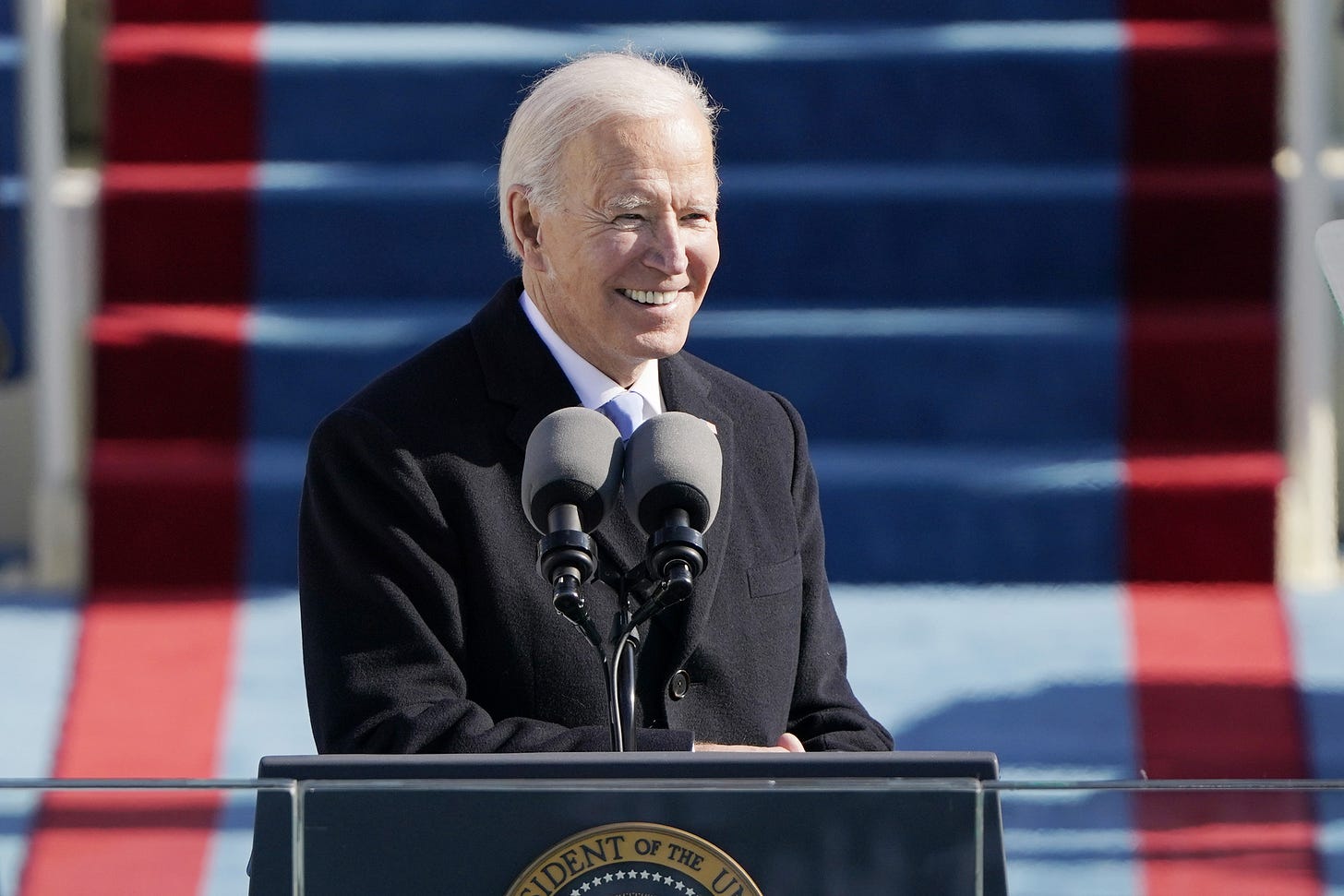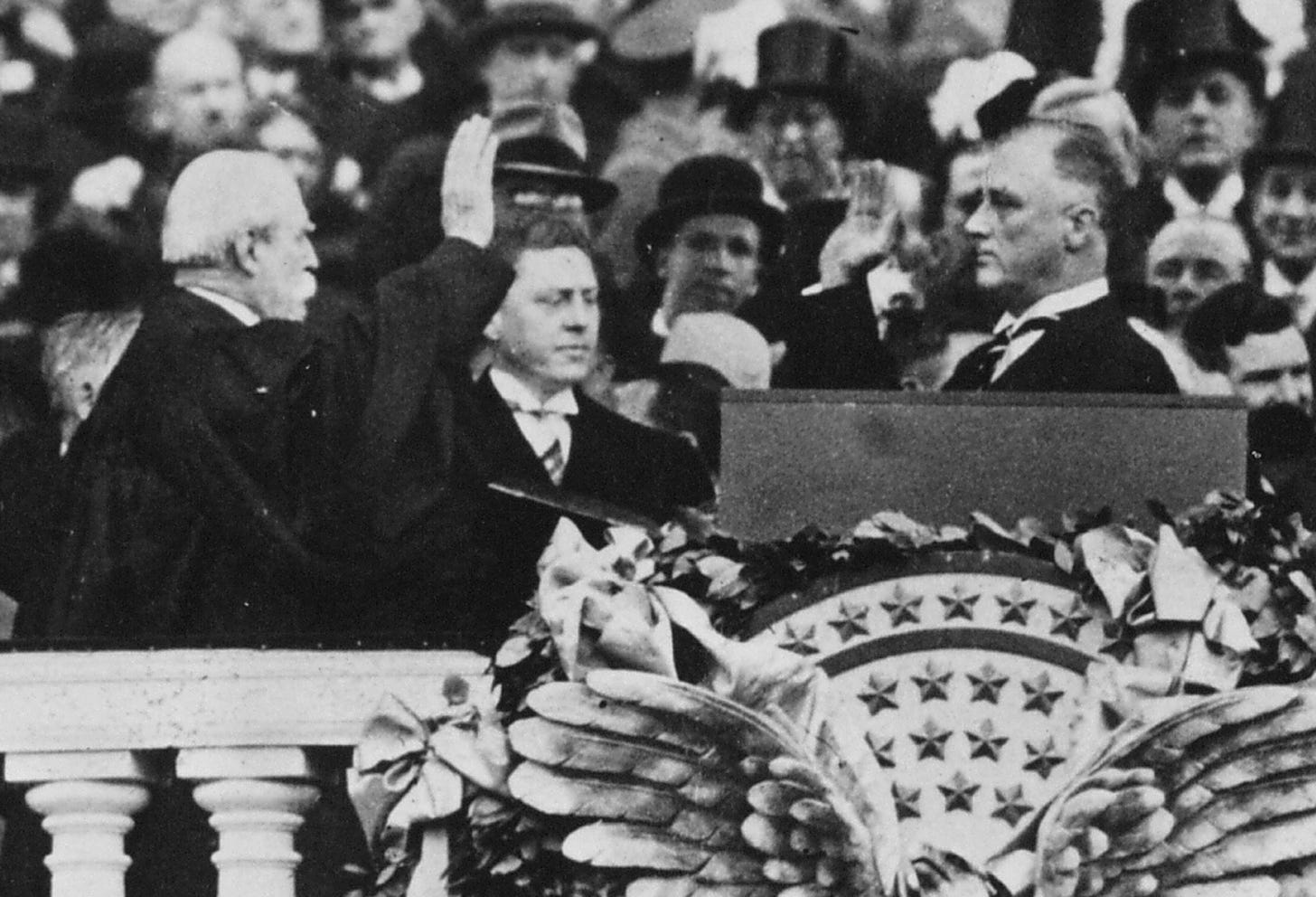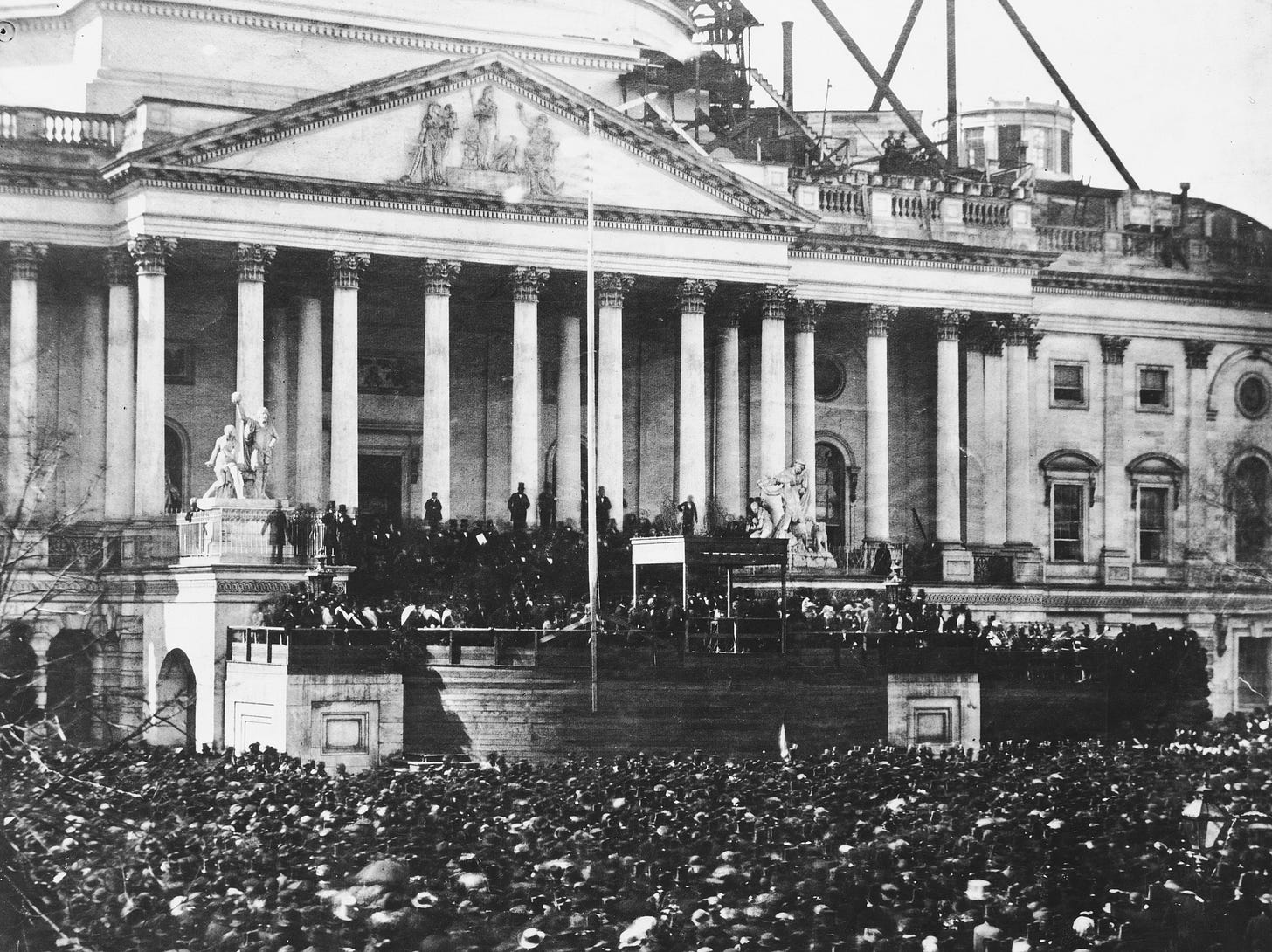An Inaugural Address for America’s Defining Moment
President Biden speaks of an American story “of decency and dignity, love and healing, greatness and goodness.”

Which newly elected president delivered his inaugural address in more challenging circumstances than Joseph R. Biden? Only Abraham Lincoln and Franklin Roosevelt.
In 1861, Lincoln faced the worst passage in American history—his very election provoked secession by Southern states wedded to human slavery. Concluding his inaugural address, Lincoln famously implored them to reconsider:
We are not enemies, but friends. We must not be enemies. Though passion may have strained, it must not break our bonds of affection. The mystic chords of memory, stretching from every battle-field, and patriot grave, to every living heart and hearthstone, all over this broad land, will yet swell the chorus of the Union, when again touched, as surely they will be, by the better angels of our nature.
But as so often since, the passion for racial subjugation suffocated our angels. What followed included the bloodiest war in American history; the emancipation of slaves; a military victory whose promise foundered with Lincoln’s assassination; and a “reconciliation” with the South which embedded white supremacy. Reconstruction failed; blacks were disenfranchised; de facto slavery continued in the form of peonage, terror, and oppression. A century later, the civil rights movement triggered a backlash which redefined Lincoln’s party as the refuge of a racial animus which Donald Trump inflamed—culminating in an effort to, yet again, disenfranchise blacks.
Lincoln’s first inauguration, with the unfinished Capitol dome behind him, on March 4, 1861.
As Franklin Roosevelt commenced his first inaugural address, the nation faced an existential crisis second only to that confronting Lincoln 72 years prior. America’s financial system had collapsed, plunging millions into desperation and despair. Even the cosseted wealthy whose ungoverned speculation had created such misery felt menaced by the conflagration.
Some doubted that capitalism, or even democracy, could survive this seismic upheaval. Amid the wreckage lay America’s shattered confidence. Roosevelt’s sole advantage was that the Great Depression bred a popular mandate.
The initial task facing FDR had a daunting clarity: restoring hope. Hence the most indelible phrase of his inaugural address: “the only thing we have to fear is fear itself.”
The ruin Roosevelt described was indubitable: silent factories; shuttered businesses; fallow farms; vanished savings; an army of the unemployed or underpaid who “face the grim problem of existence.” Nor was it difficult to identify “the unscrupulous money changers” who authored the ruin, or to proclaim that “the measure of [America’s] restoration lies in the extent to which we apply social values more noble than mere monetary profit.”
“We must act,” Roosevelt concluded, “and act quickly.”

Franklin D. Roosevelt is sworn in for his first term by Chief Justice Charles Evans Hughes, on March 4, 1933.
Starting with his “first hundred days,” FDR reshaped the relationship between the government, the economy, and ordinary Americans—building a coalition for activist governance which dominated our next half-century until, exhausted, it was overcome by the dehumanizing abstractions of “free-market” capitalism that redistributed wealth to an increasingly privileged few. Saved from disaster by Roosevelt’s New Deal, at length we forgot its lessons.
Now Biden now must summon his own New Deal to overcome the privations wreaked by COVID-19 on those already victimized by the Darwinian economics Roosevelt decried. As America’s billionaires increased their net worth by over $1 trillion, “essential workers” suffered unsafe conditions, sustained unemployment, and death by class—particularly African Americans. The battles of Lincoln and Roosevelt persist.
While America’s crisis of 2021 evokes those of 1861 or 1933, its tributaries are multifarious.
We are embroiled in a figurative civil war rooted in cultural resentment and the enduring antagonisms of race. We lack a common understanding of the challenges we face—or the reality we live in. The ravages of COVID-19 were aggravated by Americans who believe that public health measures necessary to protect us constitute oppression.
We are beset by widening economic disparities perpetuated by a political system which allows the fortunate to appropriate its spoils. A seditious would-be lynch mob overran our capital a mere two weeks ago, yet a substantial cohort of Americans support them—or blame imaginary perpetrators.
Its provocateur, our outgoing president, has been twice impeached—but retains the devotion of millions certain that Biden unseated him through fraud. The party which enabled Trump promotes white identity politics, minority rule, and a nihilistic enmity to governance itself.
We symptomatize a nation in decline—implacable bigotry, an ossifying class system, a crippling political stasis, a mass addiction to misinformation, the subordination of reason to hatred and fear. We seem unable to master our problems, or agree upon what they are. In bitterness, if not in kind, our divisions conjure the schism facing Lincoln.
In the volatile interregnum between his election and inauguration, Biden has met the extraconstitutional depredations of Trump and his party with unwavering grace. Though pointed in condemning Trump’s behaviors, he has embraced bipartisanship while invoking America’s historic ability to surmount the most daunting challenges.
But never have they been so numerous. Biden’s immediate imperative is to subjugate a pandemic swollen by Trump’s murderous indifference, his followers’ disdain for public health measures, and new variants of a virus which has already taken over 400,000 lives—equaling the toll of American dead in World War II and two-thirds of that estimated for “Mr. Lincoln’s War.”
Biden’s initiative to inoculate 100 million Americans in a hundred days echoes Roosevelt’s ambitions: enlisting pharmacies, building mobile clinics, mobilizing a health corps to serve minority communities—and, perhaps most difficult, persuading Trump’s disbelievers to respect science.
His $1.9 trillion “American Rescue Plan” dwarfs the emergency relief plan passed in December by a divided Congress: an additional $1,400 for many; $400 a week in supplemental unemployment benefits; a $15 per hour minimum wage; aid to struggling schools, businesses, states and cities; emergency paid sick leave; housing and childcare assistance; tax credits for low income families. Already, congressional Republicans who passed Trump’s tax cuts for the wealthy decry the expense.
To build momentum, Biden will immediately repeal the Muslim travel ban, rejoin the Paris climate record, curb evictions and student loan repayments, and accelerate efforts to reunite migrant families separated by Trump’s cruelty. One can hear Republicans, so acquiescent to Trump, denouncing rule by executive fiat. The question is how they will receive Biden’s simultaneous proposal of a pathway to citizenship for 11 million undocumented immigrants.
The prospects for speedy Senate consideration of Biden’s legislative proposals and cabinet nominees are complicated by a pending impeachment trial—an ordeal at once corrosive and morally indispensable. The Republicans who sought to upend Biden’s election, yet now oppose impeachment as “divisive,” advocate an insidious moral amnesia. The “reconciliation” which extinguished Reconstruction serves as lesson: “Healing” without accountability perpetuates the evils it proposes to dispel.
The cataclysm which Trump provoked included white supremacists, extremists on the government’s terrorist watch list, and military and law enforcement personnel—abetted, some House members believe, by pro-Trump colleagues. A relentless investigation is but the beginning. The new administration must counteract by every lawful means the right-wing extremism which brought us to this moment.
Instead of hope, the inaugural symbolized fear. Biden spoke in a city whose bridges, streets, and subway stations were closed against attack, controlled by 20,000 National Guard troops subjected to security checks. Among his grimmest duties is preventing this Hobbesian dystopia from becoming America’s new normal.
Amid these perils, Biden struck the chords which dire necessity thrust upon Roosevelt and Lincoln—combining hope, resolve, candor, and moral clarity with an urgent plea for unity. Biden won’t be America’s last president. But his presidency may well be our last, best chance to summon our own better angels. In its first moments, Biden did his best.
“This is America’s day,” he began. “A day of history and hope, of renewal and resolve. . . . At this hour, my friends, democracy has prevailed.”
As for the task before him, he paraphrased Lincoln to assure us: “My whole soul is in it.” But he swiftly eschewed triumphalism—his country’s, or his own—in favor of determination.
He started with an important acknowledgment of history. “I know the forces that divide us are deep and they are real. But I also know they are not new. Our history has been a constant struggle between the American ideal that we are all created equal, and the harsh ugly reality that racism, nativism, fear, demonization have long torn us apart. The battle is perennial, and victory is never assured.”
Decrying “the culture in which facts themselves are manipulated and even manufactured” he appealed to our hopes and our consciences: “We have to be different than this. America has to be better than this. I believe America is so much better than this.”
Here we stand, just days after a riotous mob thought they could use violence to silence the will of the people, to stop the work of our democracy, to drive us from this sacred ground. It did not happen. It will never happen. Not today. Not tomorrow. Not ever.
Naming our challenges, he set forth the choices they present us. “We face an attack on our democracy and on truth, a raging virus, growing inequity, the sting of systemic racism, a climate in crisis, America’s role in the world. Any one of these would be enough to challenge us in profound ways. But the fact is, we face them all at once, presenting this nation with one of the gravest responsibilities we’ve had.”
I promise you, we will be judged, you and I, by how we resolve these cascading crises of our era. Will we rise to the occasion, is the question. Will we master this rare and difficult hour?
Will we meet our obligations, and pass along a new and better world to our children? I believe we must. . . . I believe we will. He concluded by envisioning a partnership between president and people to reclaim our destiny from all that besets us:
Together we shall write an American story of hope, not fear; of unity, not division; of light, not darkness. A story of decency and dignity, love and healing, greatness and goodness. May this be the story that guides us, the story that inspires us, and the story that tells ages yet to come that we answered the call of history, we met the moment.
Today this good man met the moment by speaking to our best selves. The question is whether Americans can yet find the will, and goodwill, to help repair our stricken country. By placing our future in Joe Biden’s hands, we have also taken it into our own.




